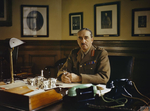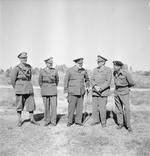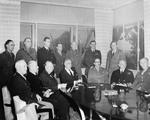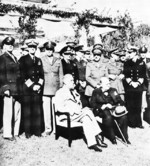Alan Brooke
| Surname | Brooke |
| Given Name | Alan |
| Born | 23 Jul 1883 |
| Died | 17 Jun 1963 |
| Country | United Kingdom |
| Category | Military-Ground |
| Gender | Male |
Contributor: C. Peter Chen
ww2dbaseAlan Francis Brooke was born in Bagnères-de-Bigorre in France to Victor Brooke of Ulster, a wealthy Northern Irish man. After education in France, he attended Royal Military Academy in Woolwich, England, and graduated as an artillery officer. He served in Ireland and India, then with the Royal Artillery he served in France during WW1. At the end of the war he achieved the rank of lieutenant colonel. In the interwar years, he taught at Camberley Staff College and the Imperial Defence College.
ww2dbaseAt the start of WW2, Brooke commanded the Second Corps of the British Expeditionary Force, which failed to stop the German invasion. He played a major role in the Dunkirk evacuation, in which he was credited in providing the vital defenses that allowed the troops to be evacuated by naval vessels in the rear. In Jul 1940 he became the commander of the United Kingdom Home Forces, then in Dec 1941 Chief of the Imperial General Staff and Chairman of the Chiefs of Staff Committee. He was also a vital member in the planning of the Normandy invasions of 1944. His public disagreements with some of Winston Churchill's policies made these appointments surprising, but it also reflected Churchill's respect for his leadership ability. Like Bernard Montgomery, Brooke was also a contender for the position of Supreme Commander of Allied forces in Europe, but that position was eventually given to Dwight Eisenhower based upon the percentage of men and materiel the United States had contributed to the alliance. "[Brooke] was highly intelligent and earnestly devoted to the single purpose of winning the war", said Eisenhower. "He did not hesitate to differ sharply and vehemently, but he did it forthrightly and honestly.... He must be classed as a brilliant soldier." He was promoted Field Marshal in 1944 and made Baron Alanbrooke of Brookenborough, County Fermanagh, in 1945.
ww2dbaseAfter the war, in Nov 1945, as Britain's chairman of chiefs of staff, he visited Douglas MacArthur in Japan. MacArthur found him to be "a professional soldier of the highest class" who "had a broad view of global strategy that had no inhibitions of service rivalry." In 1946, he was made Viscount Alanbrooke. He later served as Chancellor of the Queen's University of Belfast until his death in 1963. He now rests in his home village of Hartley Wintney, Hampshire, where the last heir to the Alanbrooke viscountcy still lives.
ww2dbaseHis memoirs were published in 2001. It stirred controversy for his criticism of Churchill's wartime decisions.
ww2dbaseSources: Crusade in Europe, Reminiscences, Spartacus Educational, Wikipedia.
Last Major Revision: Aug 2006
Alan Brooke Interactive Map
Photographs
 |  |  |  |
Alan Brooke Timeline
| 23 Jul 1883 | Alan Brooke was born. |
| 31 Oct 1938 | Lieutenant-General Alan Brooke took over command of the newly created Anti-Aircraft Corps with responsibility for inspection, training and discipline, while the actual operational control was vested in the Air Officer Commanding RAF Fighter Command, Air Marshal Sir Hugh Dowding, since the handling of the air defences demanded the closest co-operation between fighter pilots, guns and searchlights. |
| 19 Jul 1940 | British General Alan Brooke took over as Commander-in-Chief of Home Forces, relieving Edmund Ironside. Ironside was promoted to Field Marshal as consolation; he had only been at the helm of Home Forces for two months. |
| 3 Sep 1941 | In England, United Kingdom, Alan Brooke inspected 70 Welsh Young Soldiers’ Battalion at Duxford, A Company of 70th King's Royal Rifle Corps at Debden, and B Company of 70th King's Royal Rifle Corps at Castle Camp in the morning. After lunch with Prime Minister Winston Churchill, he inspected A and B Companies of 70th Suffolks regiment at Martlesham and A and B Companies of 70th Essex regiment at Southend. He was disappointed by the progress of the training of the Essex regiment. |
| 25 Dec 1941 | General Sir Alan Brooke replaced General Sir John Dill as Chief of the Imperial General Staff (CIGS). |
| 14 Apr 1942 | In a speech at a meeting with Franklin Roosevelt's representatives in London, England, United Kingdom, General Alan Brooke on behalf of the Chiefs-of-Staff Committee insisted that it must be essential to hold the Japanese and to ensure that there should be no junction between them and the Germans that could gravely threaten Allied oil supplies from the Persian Gulf. |
| 6 Aug 1942 | Alan Brooke declined Winston Churchill's offer of the appointment to head Middle East Command, telling the Prime Minister that there would be no time to reorganise the Imperial General Staff and that he had no knowledge of desert warfare. Secretly he confided in his diary that he felt he would serve better by remaining in his present post in order to exercise some control over the Prime Minister's wilder schemes and, also, to prevent Claude Auchinleck from thinking that he had come out on purpose to work his way into the latter's shoes. |
| 7 Aug 1944 | During a strategy conference in London, England, United Kingdom, Alan Brooke determined that the next Allied target in Burma should be Rangoon, and the best method of attack would be an airborne assault. |
| 28 Jun 1945 | The British Chiefs of Staff drove to Bletchley Park, where Sir Alan Brooke addressed four hundred of its staff, thanking and congratulating them for their extraordinary contribution to the Allied war effort. |
| 17 Jun 1963 | Alan Brooke passed away. |
Please consider supporting us on Patreon. Even $1 per month will go a long way! Thank you. Please help us spread the word: Stay updated with WW2DB: |
Visitor Submitted Comments
All visitor submitted comments are opinions of those making the submissions and do not reflect views of WW2DB.

» Invasion of France and the Low Countries
» Second Washington Conference
» Casablanca Conference
» Quadrant Conference
» Cairo Conference
» Octagon Conference
» Malta Conference
» Yalta Conference
- » 1,182 biographies
- » 337 events
- » 45,115 timeline entries
- » 1,248 ships
- » 350 aircraft models
- » 207 vehicle models
- » 376 weapon models
- » 123 historical documents
- » 261 facilities
- » 470 book reviews
- » 28,414 photos
- » 365 maps
Thomas Dodd, late 1945
Please consider supporting us on Patreon. Even $1 a month will go a long way. Thank you!
Or, please support us by purchasing some WW2DB merchandise at TeeSpring, Thank you!
20 Nov 2014 03:53:57 PM
Brooke also participated at the Yalta Conference. Please add.